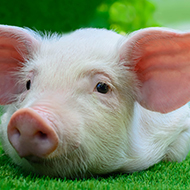
Study reveals insights into the moral views of animals across three age groups.
Children differ significantly from adults in their moral views of animals, new research suggests.
The study led by the University of Exeter asked children between nine and 11 years old about their moral status and treatment of farm animals, humans and pets.
Researchers found that, unlike adults, children say farm animals should be treated equally to humans and pets - and think eating animals is less morally acceptable than adults do.
This finding suggests that “speciesism” – a moral hierarchy that gives different values to different animals – is learned during adolescence.
Dr Luke McGuire, from the University of Exeter, comented: "Humans’ relationship with animals is full of ethical double standards. Some animals are beloved household companions, while others are kept in factory farms for economic benefit.
"Judgements seem to largely depend on the species of the animal in question: dogs are our friends, pigs are food."
The study published in Social Psychological and Personality Science surveyed 479 people living in England from three age groups - 9-11, 18-21 and 29-59. It reveals that the two adult groups share similar views – suggesting attitudes to animals typically change between the ages of 11 and 18.
"Something seems to happen in adolescence, where that early love for animals becomes more complicated and we develop more speciesism," said Dr McGuire. "It's important to note that even adults in our study thought eating meat was less morally acceptable than eating animal products like milk."
The study also revealed that as people age, they are more likely to classify farm animals as "food" rather than "pets". Children were equally likely to consider pigs to fall into either of these categories.
Dr McGuire added that while adjusting attitudes is a natural part of growing up, the "moral intelligence of children" is also valuable.
"If we want people to move towards more plant-based diets for environmental reasons, we have to disrupt the current system somewhere," he said.
"For example, if children ate more plant-based food in schools, that might be more in line with their moral values, and might reduce the 'normalisation' towards adult values that we identify in this study."



 The Federation of Independent Veterinary Practices (FIVP) has announced a third season of its podcast, Practice Matters.
The Federation of Independent Veterinary Practices (FIVP) has announced a third season of its podcast, Practice Matters.